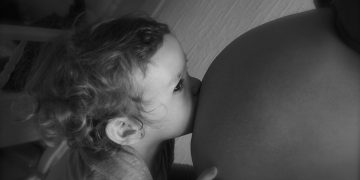Newborn jaundice is a common condition that affects many infants in the first few days of life. It is characterized by a yellowing of the skin and eyes due to elevated levels of bilirubin in the blood. While most cases of newborn jaundice are harmless and resolve on their own, it is important for parents to be aware of the symptoms and seek medical attention if necessary. In this article, we will discuss the telltale signs of newborn jaundice, common questions surrounding the condition, and what parents can do to help their baby.
What is Newborn Jaundice?
Newborn jaundice, also known as neonatal jaundice, is a condition that occurs when a baby’s liver is not fully developed and is unable to effectively process bilirubin, a waste product produced by the breakdown of red blood cells. Bilirubin is typically excreted from the body through the urine and stool, but in newborns, it can build up in the blood and cause the skin and eyes to turn yellow.
Common Symptoms of Newborn Jaundice
There are several telltale signs of newborn jaundice that parents should be aware of. These include:
- Yellowing of the skin and eyes
- Pale stools
- Dark urine
- Irritability or difficulty feeding
- Lethargy
Diagnosing Newborn Jaundice
If parents suspect that their baby has jaundice, they should seek medical attention immediately. A healthcare provider can perform a physical examination and may recommend blood tests to measure the levels of bilirubin in the blood. In some cases, a skin test may also be performed to assess the severity of the jaundice.
Treatment Options
In most cases, newborn jaundice does not require treatment and will resolve on its own within a few days to weeks. However, in severe cases where the levels of bilirubin are very high, treatment may be necessary. This can include phototherapy, where the baby is exposed to special lights that help break down the bilirubin in the skin, or in rare cases, a blood transfusion may be required.
Common Questions About Newborn Jaundice

Parents often have many questions about newborn jaundice, including:
- Is jaundice harmful to my baby?
- Can jaundice be prevented?
- How long does jaundice last?
Is Jaundice Harmful to My Baby?
Most cases of newborn jaundice are harmless and do not cause any long-term complications. However, in rare cases where the levels of bilirubin are very high, jaundice can lead to serious complications such as brain damage. This is why it is important for parents to seek medical attention if they suspect that their baby has jaundice.
Can Jaundice Be Prevented?
While there is no surefire way to prevent newborn jaundice, there are certain factors that can increase the risk of the condition. These include premature birth, a blood type incompatibility between the mother and baby, and breastfeeding difficulties. Parents can help reduce the risk of jaundice by ensuring that their baby is feeding well and receiving regular check-ups with a healthcare provider.
How Long Does Jaundice Last?
Most cases of newborn jaundice will resolve on their own within a few days to weeks. However, in some cases where the levels of bilirubin are very high, jaundice may persist for longer. It is important for parents to follow the recommendations of their healthcare provider and monitor their baby closely for any signs of improvement or worsening of the condition.
Conclusion
Newborn jaundice is a common condition that affects many infants in the first few days of life. While most cases of jaundice are harmless and resolve on their own, it is important for parents to be aware of the symptoms and seek medical attention if necessary. By understanding the telltale signs of newborn jaundice, parents can ensure that their baby receives the care and attention they need to stay healthy.
Remember, if you suspect that your baby has jaundice, don’t hesitate to contact your healthcare provider for guidance and support. Early detection and intervention can help prevent complications and ensure the health and well-being of your little one.







































